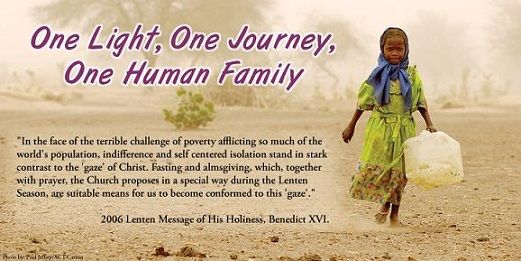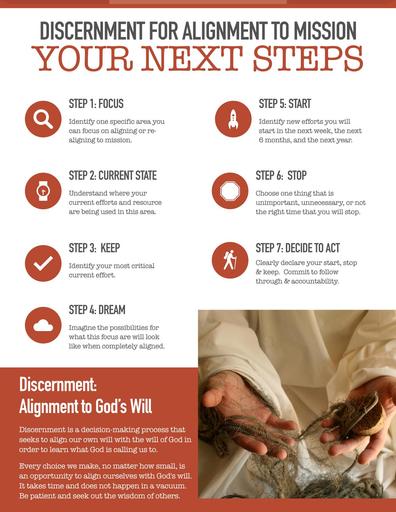It just makes sense
If you've read the other articles in this series, it should be obvious that almsgiving is simply a response by us to God - a response to the insights we have gained through prayer and fasting. We do not give because we are required to give or because we feel guilty if we don't, but because we are so greateful for all that God has given us.
Ultimately our journey of Lent may begin with by reflecting on "me and God," but our prayer and fasting lead us to the realization that none of us are walking this journey alone - that the needs of all are the responsibility of all in the Body of Christ.
In his Message for Lent 2015, Pope Francis asks us to reach out to those in need:
"...we can help by acts of charity, reaching out to both those near and far through the Church’s many charitable organizations. Lent is a favorable time for showing this concern for others by small yet concrete signs of our belonging to the one human family."
Mike Aquilina breaks down the challenge of almsgiving and explains why it is the most neglected of the three pillars of Lent:
Many Americans today enjoy a better standard of life than any Byzantine emperor ever knew. Central heat, central air conditioning, electric lights, consistently safe food and water, antibiotics, and even aspirin — these are luxuries beyond the dreams of our ancient ancestors.
We are living high, but are we giving high?
It's a good question to ask ourselves during Lent. It is a scandal, after all, for Christians to have closets overstuffed with clothing when there are families who are shivering because they can't pay their heating bill. It is a scandal for Christians to be epidemically overweight when they have near neighbors who go to bed hungry.
We need to give to God — whom we meet in our neighbor — until these problems go away.
How to Give?
-
- Tithe. Throughout history, many Christians have used the Old Testament practice of "tithing" as a guide — that is, they give a tenth of their income "to God." In practice, that means giving it to the poor, to the parish, or to charitable institutions.
-
- Look around your house at all the worldly goods with which you have been blessed. Are there any you can do without? The St. Vincent de Paul Society, or other charitable organization, would be happy to receive them.
-
- Participate in 40 Bags in 40 Days and donate gently used or new items to homeless shelters, crisis pregnancy centers, St. Vincent de Paul or other organizations.
-
- Learn about an area of the world that is impoverished or a social injustice that exists in your community. Collect funds during Lent to donate to an organization that meets the needs of those individuals.
-
- Call your local food bank or soup kitchen and find out what items they most need. Each time to you go to the store, add a few of those items to your cart and drop the donation off on your way home.
-
- Take advantage of the many resources put out by Catholic Relief Services including the Rice Bowl.
This list certainly isn't exhaustive, but hopefully it helps you to enter into your Lenten journey a little more deeply!



